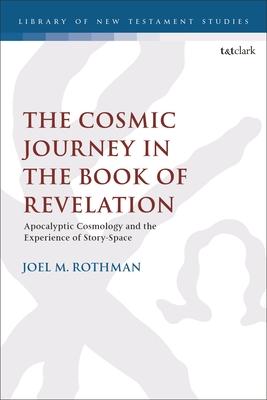Joel M. Rothman considers the significance of cosmology in biblical and extra-biblical texts, and the role of the cosmic journey in many apocalyptic narratives. He posits that Revelation's narrative likewise takes the hearer on a virtual journey, through a cosmic story-space of great theological significance. While scholarship commonly assumes a three-tiered cosmos in Revelation, Rothman argues that Revelation's narrative operates in a four-tiered cosmos, with the hyper-heaven sitting above the sky-heaven, earth, and abyssal depths; a cosmic story-space that is recreated in the imagination of the hearers.
Beginning with a methodology of visual narrative reading, Rothman then discusses the assumptions and existing conceptions regarding heaven and earth. He stresses that Revelation does not exhibit tension in its portrayal of heaven - between heaven as a site of conflict and heaven as the realm in which God truly reigns - but rather shows readers a sky-heaven characterised by archetypal conflict between powerful sky-beings and a hyper-heaven defined by full recognition of the Throne. In journeying through the sky-structure and God-space and by analysing the four cosmic layers in operation, the distinct nature of the two sky-spaces, cosmic change and the ideological import of the cosmic structure, Rothman demonstrates that the existence of the hyper-heaven - in contradistinction with the limited lived-cosmos of earth and sky-heaven - is a present guarantee of the final cosmic transformation that creates a new space for human life, exclusive of imperial draconian elements.
Book
The Cosmic Journey in the Book of Revelation: Apocalyptic Cosmology and the Experience of Story-Space
(Write a Review)
Paperback
$44.39
Joel M. Rothman considers the significance of cosmology in biblical and extra-biblical texts, and the role of the cosmic journey in many apocalyptic narratives. He posits that Revelation's narrative likewise takes the hearer on a virtual journey, through a cosmic story-space of great theological significance. While scholarship commonly assumes a three-tiered cosmos in Revelation, Rothman argues that Revelation's narrative operates in a four-tiered cosmos, with the hyper-heaven sitting above the sky-heaven, earth, and abyssal depths; a cosmic story-space that is recreated in the imagination of the hearers.
Beginning with a methodology of visual narrative reading, Rothman then discusses the assumptions and existing conceptions regarding heaven and earth. He stresses that Revelation does not exhibit tension in its portrayal of heaven - between heaven as a site of conflict and heaven as the realm in which God truly reigns - but rather shows readers a sky-heaven characterised by archetypal conflict between powerful sky-beings and a hyper-heaven defined by full recognition of the Throne. In journeying through the sky-structure and God-space and by analysing the four cosmic layers in operation, the distinct nature of the two sky-spaces, cosmic change and the ideological import of the cosmic structure, Rothman demonstrates that the existence of the hyper-heaven - in contradistinction with the limited lived-cosmos of earth and sky-heaven - is a present guarantee of the final cosmic transformation that creates a new space for human life, exclusive of imperial draconian elements.Paperback
$44.39